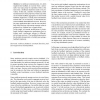Free Online Productivity Tools
i2Speak
i2Symbol
i2OCR
iTex2Img
iWeb2Print
iWeb2Shot
i2Type
iPdf2Split
iPdf2Merge
i2Bopomofo
i2Arabic
i2Style
i2Image
i2PDF
iLatex2Rtf
Sci2ools
NGC
2001
Springer
2001
Springer
Extremum Feedback for Very Large Multicast Groups
In multicast communication, it is often required that feedback is received from a potentially very large group of responders while at the same time a feedback implosion needs to be prevented. To this end, a number of feedback control mechanisms have been proposed, which rely either on tree-based feedback aggregation or timer-based feedback suppression. Usually, these mechanisms assume that it is not necessary to discriminate between feedback from different receivers. However, for many applications this is not the case and feedback from receivers with certain response values is preferred (e.g., highest loss or largest delay). In this paper, we present modifications to timerbased feedback suppression mechanisms that introduce such a preference scheme to differentiate between receivers. The modifications preserve the desirable characteristic of reliably preventing a feedback implosion.
Related Content
| Added | 30 Jul 2010 |
| Updated | 30 Jul 2010 |
| Type | Conference |
| Year | 2001 |
| Where | NGC |
| Authors | Jörg Widmer, Thomas Fuhrmann |
Comments (0)

